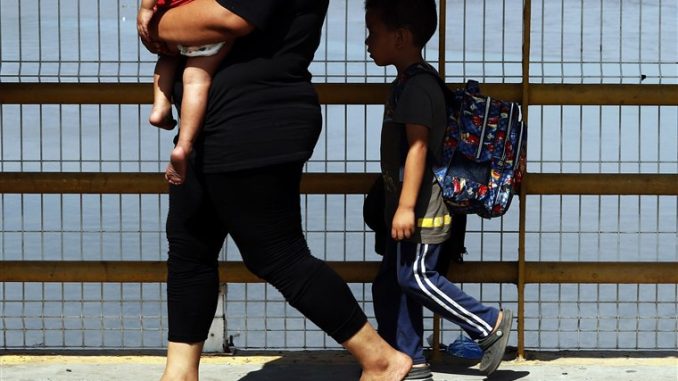
A migrant waits at the Mexico-United States border crossing in Tijuana, Mexico.
The Trump administration has implemented a secretive pilot program along the Texas border that slashes the time Mexicans seeking asylum in the US have to prepare their immigration cases and aims to speed up a decision while in government custody, according to internal government documents obtained by BuzzFeed News.
The pilot program, titled Humanitarian Asylum Review Process (HARP), targets Mexicans seeking asylum in the US who present themselves at the border in the El Paso, Texas, area by placing them in Border Patrol custody and processing their asylum screenings within 10 days.
Experts and those with knowledge of the program, which was quietly implemented in recent weeks, believe the aim of the expedited processing for Mexicans is clear.
“It’s another brick in the virtual wall they are creating to block asylum-seekers from entering the US,” said Sarah Pierce, a policy analyst at the Migration Policy Institute.
Under the program, Mexican asylum-seekers detained by Border Patrol agents are given an initial screening, called a credible fear interview, by US Citizenship and Immigration Services asylum officers within 48 hours. If a request for safe refuge is denied, immigrants can have an appeal heard over the phone by an immigration judge, according to government documents and those with knowledge of the policy.
A DHS spokesperson did not immediately have a comment on the program.
The effort appears to be the latest attempt by the Trump administration to experiment with policies aimed at quickly screening and potentially removing asylum-seekers at the border. The administration has overhauled the asylum system, which the president has frequently criticized, by forcing some asylum-seekers to remain in Mexico while their cases are processed, and denying protections to those who crossed through Mexico en route to the southern US border.
A similar pilot program, first reported by the Washington Post, targets those who are subject to a policy denying asylum for those who cross through Mexico. Mexican nationals, however, are not banned from obtaining asylum under that rule.
(snip)
“They are trying to make sure that families — from Mexico in particular — don’t get access to the US,” said one government official with knowledge of the pilot. “This is their way of making sure that Mexicans are not entering in large numbers.”
During a credible fear interview, immigrants must prove there is a significant possibility that they have a well-founded fear of persecution in their home country. In the lead-up to the interview, immigrants use the time in custody to consult with attorneys or others to help them prepare their case.
“The short time frame and the limited ability to communicate with counsel ensures that less Mexican asylum seekers will pass the initial credible fear interview,” Pierce said.
In recent months, the number of Mexicans arrested at the border has risen dramatically. In October, Mexicans accounted for half of those picked up at the southern border, according to statistics obtained by BuzzFeed News. The Washington Post previously reported that there had been a 25% spike in Mexicans arrested at the border from July through September.
Drug-related homicides spiked in Mexico in 2018 to more than 33,000, an increase of 15% from the previous year. More than 100 politicians and candidates were killed by cartels in the run-up to last year’s election in Mexico, according to the Council on Foreign Relations.
“The objective would be to close the gap in legal framework that allows asylum-seekers who may not have a meritorious claim to asylum get into the United States and remain there,” one former DHS official told BuzzFeed News.
The pilot program comes on the heels of previous policy directives implemented by USCIS that have sped-up the initial screening process at the border. Previously, asylum officers were required to wait at least 48 hours after detaining an immigrant who had crossed into the US to interview them and hear their case. However, under a directive from acting USCIS Director Ken Cuccinelli in July, that window was reduced to one calendar day, according to a policy change distributed to staffers and obtained by BuzzFeed News this summer.
“It is impossible for everyone to have meaningful access to counsel within 48 hours and that is the entire intent of the program,” said Taylor Levy, an immigration attorney in El Paso. “Even if we do get calls from family members we aren’t able to see those people or meet with those people.”
*see full story by Buzzfeed News